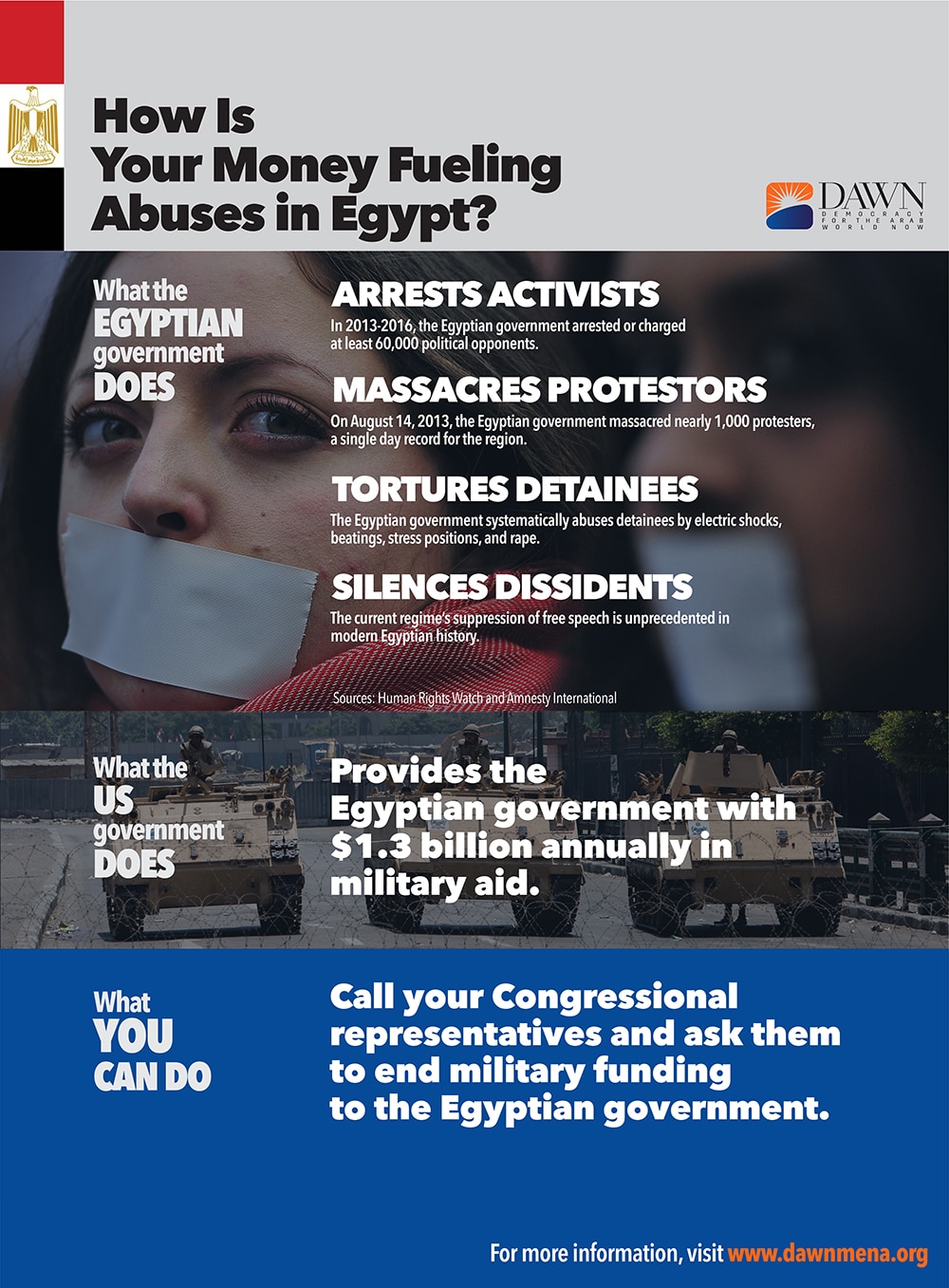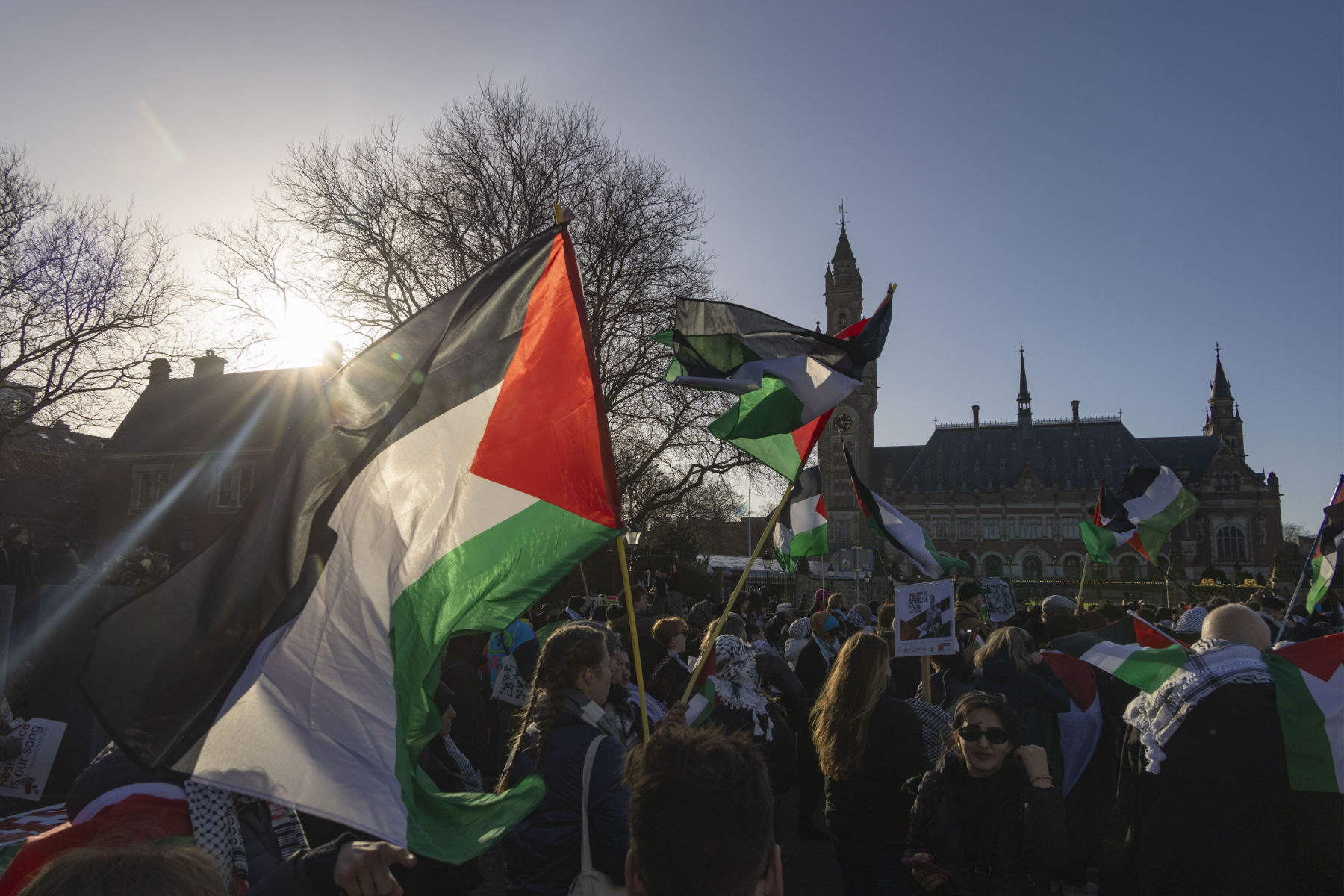Egypt's Human Rights Record
Especially since the 2013 military coup, Egypt's authoritarian government has abused its citizens' human rights and violently suppressed political dissent. President Abdel Fattah al-Sisi and his administration have massacred protestors, detained and tortured political dissidents and rights activists, suppressed speech and restricted the activities of civil society. As part of a campaign to control the Sinai Peninsula, where armed groups have carried out attacks on security personnel, Egyptian security forces have engaged in unlawful killings, forced transfer of populations, torture and disappearance. For more information, see DAWN's short review of Egypt's rights record.
U.S. Military Support
Since signing a 1979 peace treaty with Israel, Egypt has been a major beneficiary of U.S. military support, primarily through the government's Foreign Military Financing (FMF) program, which provides funds to purchase equipment and arms. Since 1987, Egypt has received $41 billion under the scheme, rendering it second only to Israel. Egypt receives one quarter of all U.S. annual FMF and since 2009 has been granted $13 billion under the program, which it uses to pay for U.S.-made weapons. Over decades of assistance, U.S. aid has accounted for 20 percent of Egypt's annual defense budget.
"The Egyptian government is using American weapons to kill people. How can the American people accept that their tax money and their weapons are used to kill people in another country?"
–Mohammed Kamal, Egyptian democracy activist and DAWN Egypt research assistant
Between 2009 and 2018, the U.S. military also provided training to 7,108 Egyptian security personnel, but a U.S. government report found that the program failed to provide adequate training regarding human rights obligations. Egyptian security forces, heavily supported by U.S. financial and military assistance, are engaging in serious violations of the laws of war and human rights law in their campaign against armed groups in the Sinai peninsula.
Diplomatic Backing
In recent years, U.S. officials have largely avoided public criticism of Egypt's human rights record, despite the abuses documented by official U.S. government sources. Instead, they have praised al-Sisi as a leader and strategic ally, adding to his credibility and legitimacy in the regional and international arena. President Donald Trump famously referred to al-Sisi as "my favorite dictator."
"Why didn't they stop the U.S. aid to the Egyptian government when the military coup took place? U.S. aid for Egypt continues, even though they know that the Sisi regime is torturing people, forcibly disappearing people, jailing people for long periods with no charge, and killing political dissidents and opponents."
-Hossam Al-Motaim, Egyptian democracy activist
For the 2021 fiscal year, President Trump requested a total of $1.45 billion in bilateral assistance for Egypt, including $1.3 billion in military aid, consistent with the amount of aid granted annually to Egypt in the last decade.

Failure to implement human rights safeguards
Since 2012, Congress has included conditions on some military funding to Egypt through the FMF program, which requires the Secretary of State to certify that the Egyptian government is taking steps to strengthen democracy and human rights. Additionally, in the wake of then General al-Sisi's military coup against elected President Mohammed Morsi in 2013, and subsequent massacres of protestors who supported Morsi, the U.S. government imposed some limitations on the kind of military equipment it would fund for Egypt.
However, these restrictions have been routinely bypassed. Aside from the 2014 fiscal year, every year Congress has included within the appropriating legislation a national security waiver, which permits the administration to release the funds if the Secretary of State deems it in the interest of national security. Both the Obama and Trump administrations have continued to release funds to Egypt, either by relying on the waiver or by declaring that Egypt has made progress towards strengthening democracy and human rights, despite overwhelming and credible to the contrary. Although the Leahy Law bars U.S. support to foreign security forces who have committed gross violations of human rights, a 2016 U.S. government study found flaws in the vetting process that is supposed to enforce the law. In addition, the ban on independent media reporting from, and access to, Sinai makes it difficult to determine concrete links between particular security forces and abuses, as the law narrowly requires.
Recommendations
"We don't want the U.S. to come to Egypt to free us. Just tell them to stop supporting the military dictatorship … and then we will be free."
–Hossam Al-Motaim, Egyptian democracy activist
DAWN recommends the withdrawal of U.S. security assistance to Egypt. The continuing provision of military equipment, provided by grants from the U.S., results in U.S. complicity in gross human rights violations. If, in the future, the Egyptian government ceases engaging in widespread and systematic human rights abuses, the U.S. government can review whether military assistance may be justified.
While the U.S. has heavily armed Egypt since it signed a U.S.-brokered peace treaty with Israel in 1979, there was no formal commitment by the U.S. to do so for the life of the treaty. The Egyptian government has many independent reasons to maintain the peace treaty with Israel, including extensive security cooperation, and there is no reason to expect that cessation of U.S. military support would lead to Egypt withdrawing from the treaty.
On the diplomatic front, the U.S. administration should support multilateral efforts to draw attention to the Egyptian regime's human rights abuses, including implementation of recommendations and reforms suggested by the United Nations Human Rights Council and U.N. committees responsible for implementing human rights treaties. Where appropriate, it should use the Magnitsky Act to sanction individual Egyptian officials responsible for abuses.






































